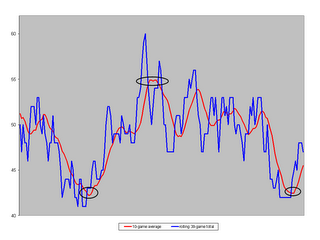Curbishley's high-water mark

Given that my recent post about Alan Curbishley’s rolling six-point form seemed to illicit an unusually high number of hits, I can only conclude that Charlton fans are eager for more statistical analysis. Hence in this post, whilst I accept that I cannot ‘prove’ that Curbs had taken us as far as he could, I hope to provide some strong graphical evidence to support that thesis.
The graph above (double-click for a clearer version) plots Curbs’ rolling 38-game points totals since 2000/01 in blue, whilst the red line shows the rolling average of the ten most recent observations (thus dampening some of the volatility and providing a smoother, albeit lagging, indicator of trend). Hence the graph begins ten games into the 2001/02 season, but the data began in earnest when we beat Man City 4-0 at the Valley to celebrate our return to the Premiership.
What should hopefully be clear from the red line is that Curbs had a strong start, faded, managed to rally the troops particularly in 2003/04 but then began the slow and steady decline which bored the fans, worried the Board and ultimately wore out Curbs himself. It was this second bout of worsening form that led to his demise, and what's key in my view is that not only did we fail to exceed that high-water mark (circled), each subsequent wave in form peaked below the previous one, a clear indicator of long-term decline.
After an outstanding 2000/01 season (52 points and 9th place), the team began 2001/2 strongly too, taking 41 points from the opening 31 games. However the traditional end-of-season slump combined with a slow start to 2002/03 saw our form bottom as highlighted in Nov 2002. The aforementioned subsequent bounce in form peaked after a 1-0 win at Spurs on 28 Dec 2003, (which took us to 37 points from just 22 games so far that season) but we again lost our way though held out enough to finish a highly creditable 7th.
It seems somewhat fitting perhaps that the final bottoming out of form (again circled) occurred after a 3-0 defeat at Arsenal on 18 Mar 2006, a performance so diabolical that it severely tested even the most fervent Curbs supporters. It was also just one of three games during an eight-match spell last season which didn’t finish goalless, a soporific period that left many fans craving entertainment over points, perhaps for the first time since that Man City game which began my analysis.
In short, in my view whilst Curbs’ resignation hastened the beginning of a new era at Charlton, it would have been the right time anyhow. It is far too early to assess Dowie’s abilities meanwhile, though he remains perhaps the best of the realistic candidates that were available during the summer.


